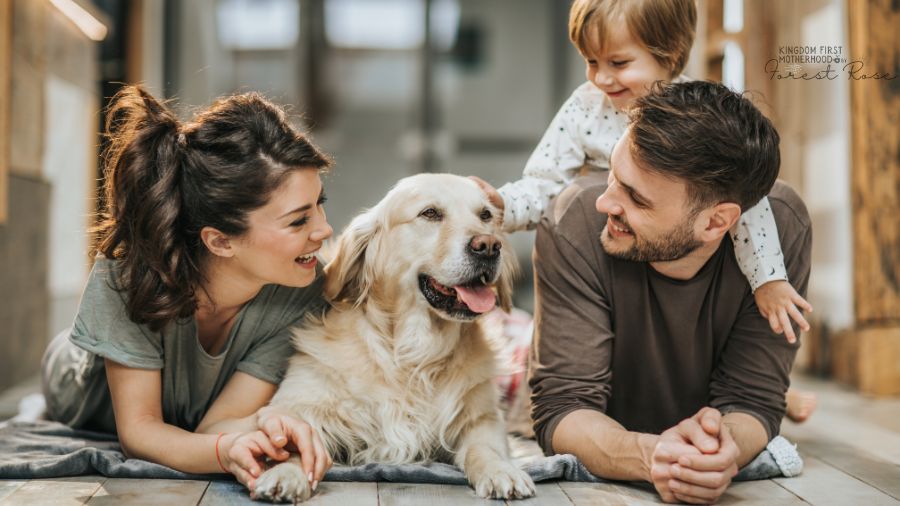Welcoming a new family dog into your home is more than just gaining a pet, it’s about embracing a bundle of joy that brings unconditional love, boundless energy, and a touch of mischief. Each wagging tail and playful bark makes family life more exciting, creating irreplaceable memories and a bond that enriches every moment together.

To keep your new furry friend healthy and happy, it’s worth looking into a trusted source for high-quality dog supplements. Just like we take vitamins to fill in the gaps, our pups can benefit from a little extra support too—whether it’s for their joints, digestion, or overall energy levels. The key is finding supplements made with real, pet-friendly ingredients that actually do what they promise. A happy, tail-wagging, zoomie-filled life starts with good nutrition, so giving your dog a little boost can go a long way in keeping them thriving for years to come.
Contents
Start With the Right Breed
Before anything else, ensure you’re bringing the right dog to your home. Do you have kids? Are there other pets? Is your place small, or is there a large yard to move around? Research all good options for families and understand how their personalities can fit into your home. Don’t decide solely based on cost or appearance.
Preparing Your Home and Garden for a New Canine Member
Dog-proofing your home is essential. Clean your home. Secure loose wires, safely store away chemicals, and remove small, chewable items to prevent accidents. Set up a warm, comfortable space inside with a dog bed, water bowl, and toys to keep your new friend entertained and content.
Your backyard will soon become your dog’s haven for playtime and relaxation. Ensure it’s a safe area by checking fences for potential escape routes, removing plants that could be harmful, and providing ample shade and water for those warmer days. You may want to look into using invisible fencing for dogs as well, as that can be a great security option. Designating a specific spot for bathroom breaks can also help in keeping your lawn and garden tidy.
Understanding Your Dog’s Needs
Like humans, health should be a priority among dogs. Take the time to understand their unique needs to make them healthy and happy in their new home.
Physical Health of Your Family Dog
A happy dog starts with good health, and understanding your new pet’s physical needs is crucial for their well-being. Every dog breed comes with its own set of health considerations, exercise requirements, and grooming needs. Regular exercise is vital, not just for their physical health but also for their mental stimulation. Tailor your dog’s activities to their energy level and age, ensuring they get the right balance of play, walks, and rest.
Nutritional Well-Being
Nutrition is a fundamental aspect of your dog’s overall well-being. Providing a balanced diet tailored to your dog’s breed, age, and size is crucial. Take the time to read the dog food label, making sure it has the necessary vitamins and minerals. Your pet’s favorite dog food must contain the essential nutrients for a happy and healthy life.
Regular Veterinary Care
Scheduling regular visits to the vet is key to preventative health care. These check-ups can catch potential health issues early, provide essential vaccinations, and offer professional advice on your dog’s specific needs. Your vet can also guide you on dental care, weight management, and any breed-specific health concerns, ensuring your dog remains happy and healthy for years to come.
Emotional and Mental Well-Being of Your Family Dog
Dogs need mental stimulation and emotional security. Toys, training sessions, and interactive games can keep their minds active, while a stable routine offers them a sense of security. Pay attention to signs of stress or anxiety and provide comfort and reassurance to help them adjust to their new home.
The Importance of Training and Socialization
Training is more than just teaching your family dog basic commands; it’s about establishing communication and building a trusting relationship. Start with fundamental commands like “sit,” “stay,” “come,” and “leave it.” These not only ensure your dog’s safety but also facilitate easier management and interaction.
Consistency is key in training—use positive reinforcement techniques such as treats and praise to encourage good behavior.
Socialization is crucial for developing a well-rounded and confident dog. It involves exposing your dog to various people, animals, environments, and situations from a young age. Let your dog enjoy outdoor activities with kids. Visit a pet park so your pooch can play with other pups. Proper socialization can prevent behavioral issues such as fear, aggression, and anxiety, making your dog more adaptable and relaxed in different settings. Remember, it’s important to keep these socialization experiences positive and controlled to avoid overwhelming your pet.
Wrapping Up
Adding a family dog to your family transforms everyday life into a series of shared moments and mutual affection. It’s about laying the groundwork for a relationship built on understanding, care, and joy. As you and your new companion learn and grow together, the journey unfolds into an enriching experience that binds your family closer, proving that the heart of a home truly does include paws.
For more homeschooling inspiration, tips and encouragement, make sure to follow KFH on Facebook, Pinterest, Instagram and Twitter, and subscribe to our Newsletter for some FREE GOODIES!
Forest Rose is a God Loving, Blessed Wife, & Mama to 3 girls. She’s passionate about lifting moms out of the trenches that are discouraged, overwhelmed, or feeling alone or isolated. Her hope is to point them to Christ and equip them to rise up with a newfound hope and joy within, that He alone can provide. Besides blogging, she also loves to create printables!



Leave a Reply